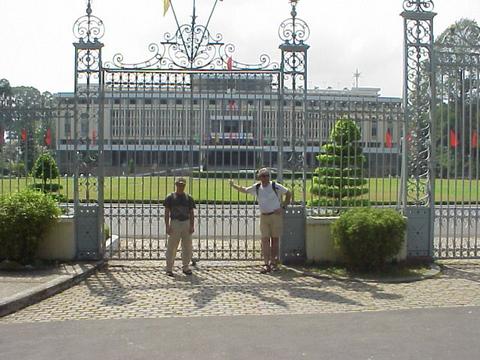For Americans, maybe it helps to continue our stroll down memory lane after the film reels end. What happened after 1975?
 All the mat xanh mui lo (blue eyed big noses - foreigners) were gone for the first time in over 100 years, except for a few Russians (referred to as "Americans without money"). The departure of the Europeans and their American cousins simply allowed regional affairs to revert to their traditional historical patterns: chafing against Cambodia with one eye on Thailand, but always the concern with China, the colossus of the north, rulers of Viet Nam for 1000 years, enemies for longer than that. All of the national heroes from the past 2 millenia rose to greatness defending Viet Nam from the northern invaders: the near-mythic Trung sisters, Tran Hung Dao's spectacular defeat of the Mongols.
All the mat xanh mui lo (blue eyed big noses - foreigners) were gone for the first time in over 100 years, except for a few Russians (referred to as "Americans without money"). The departure of the Europeans and their American cousins simply allowed regional affairs to revert to their traditional historical patterns: chafing against Cambodia with one eye on Thailand, but always the concern with China, the colossus of the north, rulers of Viet Nam for 1000 years, enemies for longer than that. All of the national heroes from the past 2 millenia rose to greatness defending Viet Nam from the northern invaders: the near-mythic Trung sisters, Tran Hung Dao's spectacular defeat of the Mongols.
Gates of the Presidential palace, where our war ended
WAR...AGAIN
Over the past 500 years VietNam had expanded southward, often at Cambodia's expense (Saigon was an old Khmer fishing village), so there's plenty of historical bad blood between the neighbors. A significant part of the Khmer Rouge genocide, the Killing Fields, was directed against Vietnamese living in Cambodia, and driven by that fact and Khmer Rouge incursions into Viet Nam proper, the Vietnamese army invaded Cambodia in 1977; the situation turned ugly and stayed ugly for almost 10 years. I visit a military cemetery in the western province of An Giang, surprised at the number of headstones with dates 1978, 1981, 1984. Cambodia's ally China decided to "teach Viet Nam a lesson" and their army crossed the Vietnamese frontier in 1979, got their noses bloodied and learned a few lessons themselves as we Americans did, but further re-established the traditional historical context.
DEPRESSION
But probably the biggest factor affecting the Vietnamese consciousness was the post-war economic depression, capital-D Depression, just as bad if not worse than the US in the 1930's. There were some poor choices made: it's a bad idea to torment the Chinese merchant class, many who lived in Saigon for generations. These people make up the business infrastructure, and their forced exit spelled disaster for the local economy. Hyperinflation set in. Political orthodoxy tried to complete the revolution and ended up strangling commerce. Life was tough, and it stayed tough for almost 15 years. That burned into the soul of the people, and its echoes reverberate now far more profoudly than the mortars and machine guns.
BABY BOOM
The other great postwar event that continues to remold the country in its own image is the baby boom. Viet Nam's population went from 45 million to 80 million. The majority of the population was born after the war. Any Vietnamese 35 year old or less has no experience of the American War; frankly, in some ways the kids are kind of tired of hearing about it: it's just not relevant, it's ancient history, people just don't spend a lot of time looking backwards. I can relate: I was born 10 years after 1945, my step-dad was on the first ship torpedoed at Pearl Harbor, but for me personally WWII is no different than the the Civil War or Napoleon's invasion of Russia.
DOI MOI - "RENOVATION"
The ideological baggage carried by the victorious war generation was pretty heavy (wars do that, they radicalize people) but the Vietnamese are generally pretty pragmatic, and Mr. Marx's theories sounded good but never really panned out very well in practice. Starting in 1986, with successive waves throughout the 90's, economic liberalization and free market reforms went from tentative to virtually unstoppable. Today the whole country feels like a flea market, people are selling stuff everywhere. Still no McDonalds though, but Colonel Sanders is quite popular; perhaps his wise old gaze inspires more Confucian respect than Ronald McDonald.
YANKEES ON DONG KHOI STREET
So the American Interlude, the 14 years from 1961 to 1975, was quickly placed into historical perspective. The Vietnamese people are pretty sophisticated politically, they understood that our hearts were in the right place (unlike the colonial French, who were there basically as exploiters). Ah yes, they will say, the Americans had very good intentions, but they were blinded by their pre-conceived notions which prevented them from seeing the facts on the ground.
The return of foreigners roughly coincided with the economic recovery that started in the early-1990's and is going gangbusters today, making Viet Nam into a most dynamic and stimulating place. All in all it feels pretty normal...but Toto we are definitely not in Kansas anymore!
|

